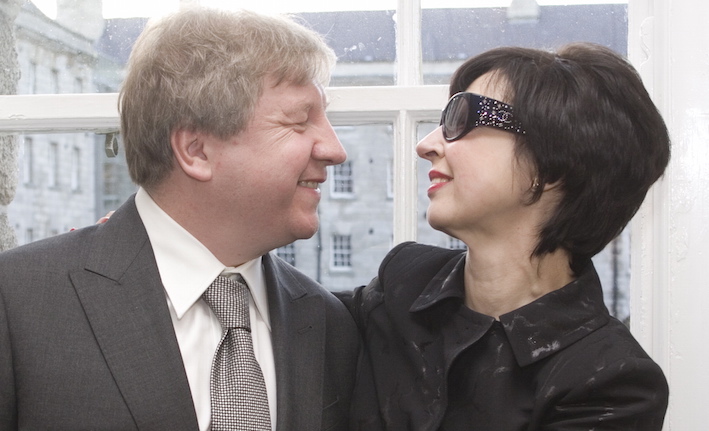 Today is five years since my wife Anne died of lung cancer. Five years is a long time, but it is only a fifth of the passionate quarter of a century in which we lived together and loved each other. Here is the tribute that I wrote to her shortly after she died.
Today is five years since my wife Anne died of lung cancer. Five years is a long time, but it is only a fifth of the passionate quarter of a century in which we lived together and loved each other. Here is the tribute that I wrote to her shortly after she died.
After she died, RTE produced a documentary titled A Parting Gift, which followed a year in the life of medical students learning from anatomical donations, including Anne’s, at Trinity College.
When her body was buried, in a positive move towards an inclusive Ireland, the Dublin Medical Schools respected Anne’s wish for a secular burial. They replaced the decades-old religious memorial stone at their burial plot in Glasnevin Cemetery with a new, neutral inclusive stone.
Our life together featured in Chris Johnson’s coffee table book, A Better Life, which aimed to visually capture the diversity of non-believers and the ways they maintain a better life, not in spite of their atheism, but because of it.
But most importantly, Anne lives on in my memories, and in those of her sister Carrie and the many family, friends and colleagues who were lucky enough to know her. She was smart, sexy, funny, courageous, loving and loyal, and she helped make Ireland more peaceful, liberal and caring.
Last week, some brave keyboard warriors tried to denigrate Anne online, because she was a southern unionist who welcomed Prince Charles when he visited Dublin in the mid 1990s. These Republicans claim that they cherish all who live on the island, yet they use the word unionist as if it was an insult.
Anne was proud to be both Irish and unionist. Her civic and political allegiance was to the Republic of Ireland, and her cultural heritage was that of one of Ireland’s forgotten minorities: a southern Anglo-Irish Protestant whose childhood family read the London Times and listened to cricket on the radio. She was also on the atheist wing of cultural Protestantism.
Anne had a proud political commitment to the Republic of Ireland, both as a member of Fine Gael, a civil servant in various Departments, and a personal assistant in Leinster House to parliamentarians from the Progressive Democrats and the Green Party. She was respected by democratic politicians from all sides of the various political divides in Ireland and Britain. She also worked with her Danish counterparts to bring the reconstructed viking ship Sea Stallion to Dublin.
She was a powerful role model for women activists at a time when politics was even more male-dominated than today, campaigning against the legal bans on abortion, homosexuality, divorce and contraception. Note for younger readers: yes, contraception. In the early 1990s the Virgin Megastore in Dublin was taken to court and fined for selling a condom.
Anne was the driving organisational force behind New Consensus peace pickets outside the Sinn Fein offices and conferences in Dublin, and outside the loyalist UDA headquarters in East Belfast, where she gathered together nationalist and unionist politicians from both sides of the border.
I was immensely proud of Anne’s courage and dignity on the day that our online Republican friends last week tried to denigrate her for. Prince Charles was visiting Dublin, and meeting the Lord Mayor at the Mansion House. Some Republican protesters gathered outside, lining the crowd barriers with hostile placards while chanting slogans and throwing eggs.
I was out of Dublin that day, when Anne arrived at the Mansion House alone, carrying a placard that welcomed Prince Charles. She made her way through the protesters to the front, draped a Union Jack over the crowd barrier, and stood with a dignified smile talking to Patsy McGarry, as some of the Republicans who surrounded her threw stink bombs.
I don’t want to denigrate the motivation of the Republican protesters, some of whom had no doubt lost loved ones at the hands of loyalist paramilitaries or members of the British security forces. But at the time of Prince Charles’ visit, Ireland was at a stage when we all needed to start moving moving beyond anger towards mutual understanding and reconciliation.
Anne was among the countless inspirational people, spanning Ireland’s many strands of cultural and political allegiances, who we should be commemorating when we mark milestones in Ireland’s history. She gave so much, so courageously, with no desire for personal reward, and without ever feeling that she had to kill anybody to bring about a more peaceful, liberal and caring Ireland.
I am proud to be working today in Atheist Ireland with people equally principled, progressive and courageous, and who, like Anne, are not intimidated by being part of an often misunderstood minority, campaigning for a secular Ireland where we are all treated equally before the law.